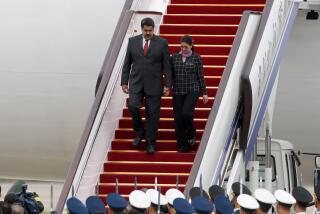Chavez seizes a unit of U.S. food firm
- Share via
CARACAS, VENEZUELA, AND BOGOTA, COLOMBIA — Amid deepening shortages of food and household supplies, President Hugo Chavez on Wednesday ordered the seizure of a Venezuelan unit of U.S. agriculture giant Cargill, the latest in a series of takeovers of foreign-owned companies.
In a speech during a ministers’ council meeting broadcast over state-run television, Chavez also threatened to seize control of privately owned Polar, the country’s largest food conglomerate and brewer. The actions came less than three weeks after Chavez won a referendum that will allow him to run for unlimited terms as president.
“If you want to take on the government, you’ll find out that this revolution is for real,” Chavez said, directing his comments to the family that owns a controlling interest in Polar.
In recent years, Chavez has imposed price controls on many basic food items, part of his socialist transformation of Venezuela’s economy. But consumers and producers have largely learned to bypass those controls via a huge black market.
Government officials said the expropriation was triggered by an inspection of a Cargill-owned Cristal rice plant in the state of Portuguesa, during which officials determined that the company was not producing rice at the regulated price.
Minneapolis-based Cargill, a global food producer and transporter that notched $120 billion in sales last year, did not respond Wednesday evening to a request for comment.
This week, Chavez sent troops to take over some Polar rice plants after accusing the company of failing to adequately supply the domestic market. In recent years, Chavez has seized various dairy farms and ranches and given them to worker-run cooperatives to manage.
Although price controls are designed to help the poor, it is low-income families that suffer through scarcities and long lines at the government-owned Mercal grocery chain, where half of all Venezuelan groceries are sold, analysts have said.
Industry officials have complained that price controls contribute to inflation, which now exceeds 30% a year, the highest in Latin America. Many domestic food companies have folded because they can’t afford to sell at the mandated price levels.
Increasingly, Chavez has been forced to import chicken, cooking oil and other staples as domestic output has declined. High oil prices had helped him finance the purchases, but their recent plunge has observers wondering how long he can keep up his strategy.
Chavez began a wave of nationalizations shortly after his reelection in December 2006, when he announced he would take over companies in strategic industries including energy and telecommunications .
In the months that followed, the government forced Verizon Communications to cede its controlling interest in CANTV, the country’s largest telecommunications company. AES of Virginia also was forced to sell its stake in Caracas Electricity Co.
Later, Chavez forced foreign companies to give up controlling interest in four so-called heavy oil projects in the Orinoco Belt oil field. Exxon Mobil and ConocoPhillips abandoned the projects instead and are fighting Chavez over a settlement. Other companies, including Chevron and Statoil, accepted Chavez’s terms.
Last year, the government took over two foreign cement plants and the steelmaker Sidor, which was controlled by an Argentine company. Chavez has also announced plans to take over Banco de Venezuela, a concern controlled by Spain’s Banco Santander.
“When someone asks if these are expropriations, tell them yes because we are going forward, not backward, and we won’t permit the bourgeois media avalanche to put us on the defensive,” Chavez told TV viewers Wednesday.
--
Mogollon is a special correspondent.
More to Read
Sign up for Essential California
The most important California stories and recommendations in your inbox every morning.
You may occasionally receive promotional content from the Los Angeles Times.













